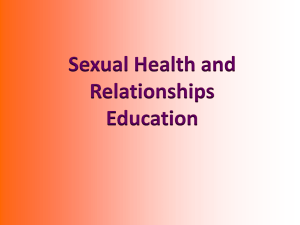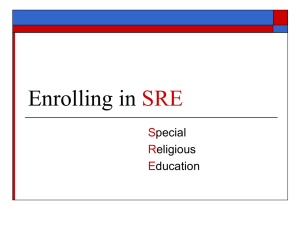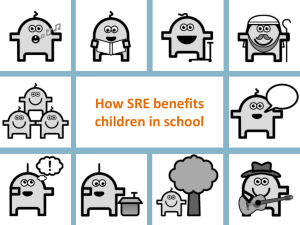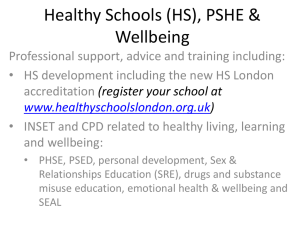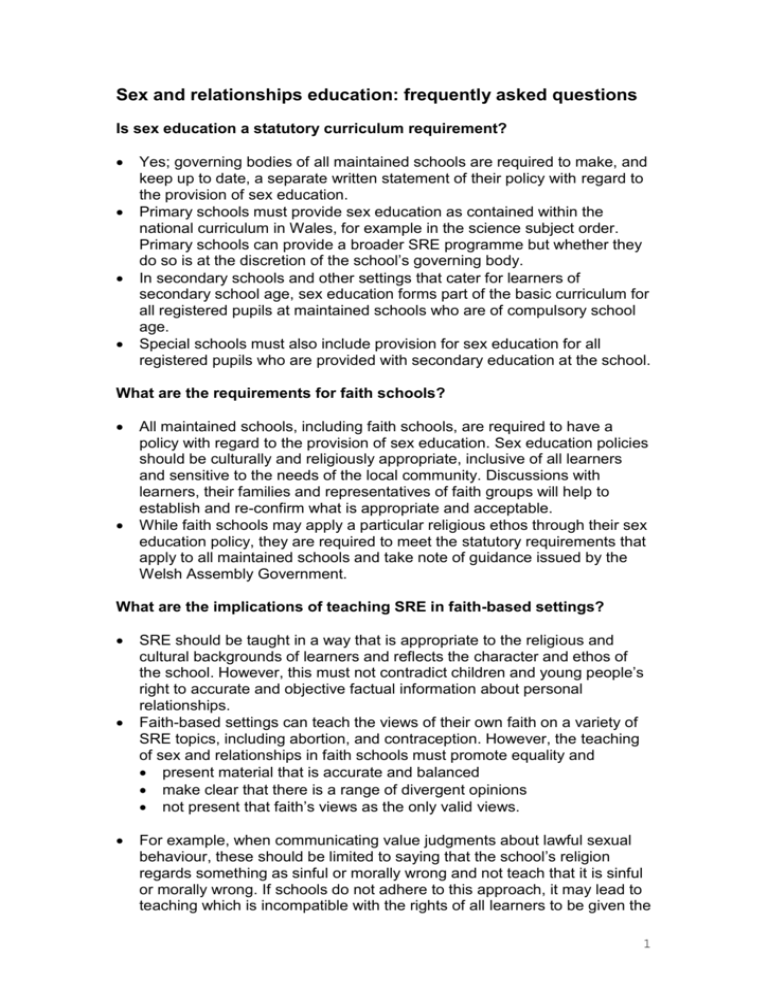
Sex and relationships education: frequently asked questions
Is sex education a statutory curriculum requirement?
Yes; governing bodies of all maintained schools are required to make, and
keep up to date, a separate written statement of their policy with regard to
the provision of sex education.
Primary schools must provide sex education as contained within the
national curriculum in Wales, for example in the science subject order.
Primary schools can provide a broader SRE programme but whether they
do so is at the discretion of the school’s governing body.
In secondary schools and other settings that cater for learners of
secondary school age, sex education forms part of the basic curriculum for
all registered pupils at maintained schools who are of compulsory school
age.
Special schools must also include provision for sex education for all
registered pupils who are provided with secondary education at the school.
What are the requirements for faith schools?
All maintained schools, including faith schools, are required to have a
policy with regard to the provision of sex education. Sex education policies
should be culturally and religiously appropriate, inclusive of all learners
and sensitive to the needs of the local community. Discussions with
learners, their families and representatives of faith groups will help to
establish and re-confirm what is appropriate and acceptable.
While faith schools may apply a particular religious ethos through their sex
education policy, they are required to meet the statutory requirements that
apply to all maintained schools and take note of guidance issued by the
Welsh Assembly Government.
What are the implications of teaching SRE in faith-based settings?
SRE should be taught in a way that is appropriate to the religious and
cultural backgrounds of learners and reflects the character and ethos of
the school. However, this must not contradict children and young people’s
right to accurate and objective factual information about personal
relationships.
Faith-based settings can teach the views of their own faith on a variety of
SRE topics, including abortion, and contraception. However, the teaching
of sex and relationships in faith schools must promote equality and
present material that is accurate and balanced
make clear that there is a range of divergent opinions
not present that faith’s views as the only valid views.
For example, when communicating value judgments about lawful sexual
behaviour, these should be limited to saying that the school’s religion
regards something as sinful or morally wrong and not teach that it is sinful
or morally wrong. If schools do not adhere to this approach, it may lead to
teaching which is incompatible with the rights of all learners to be given the
1
necessary information to make choices. It may also discriminate against
certain children in respect of their private and family life.
Can parents/carers withdraw their child from sex education?
The Welsh Assembly Government recommends that schools should
always work in partnership with parents/carers, informing them regularly in
writing about the content of the SRE programmes.
However, parents have the right to request that their child be wholly or
partly excused from receiving sex education at the school, other than sex
education contained within the national curriculum, for example in science.
Parents/carers should inform the school of their wishes in writing and
schools should keep a record of all such requests.
What aspects of sex education do schools have to teach in science?
At Key Stage 2, pupils should be given opportunities to study the names,
positions, functions and relative sizes of a human’s main organs.
At Key Stage 3, pupils should be given opportunities to study the basic
structure and function of cells, tissues, organs and organ systems and how
they support vital life processes.
Are there any plans to revise the requirements for sex education in
Wales?
No; the guidance for schools has been updated to reflect the requirements
of the school curriculum but the Welsh Assembly Government has no
plans currently to amend legislation relating to sex education.
How do the requirements for sex education in Wales compare with
England?
The provision of sex education in England is the same as that in Wales
(the same sections of the Education Act 1996 apply in both countries).
What is the difference between sex education and sex and relationships
education?
In legislation, the reference is to the inclusion of sex education in the
basic curriculum for maintained schools.
In practice, the term sex and relationships education (SRE) is
commonly used to reflect the range of learning and support which schools
provide regarding the emotional, physical and social aspects of
relationships, sexual health and well-being.
Why teach SRE?
SRE helps learners to move with confidence from childhood through
adolescence into adulthood. Schools should plan and deliver a SRE
programme that meets the specific needs of learners.
2
How do schools know what to deliver as part of their SRE programme?
The non-statutory Personal and social education framework for 7 to 19
year-olds in Wales is the key document which schools should use to
review and develop their SRE programmes.
Sex and relationships education in schools Welsh Assembly Government
Circular No. 0019/2010 (September 2010) provides further guidance on
the delivery of SRE in schools. The guidance is available online at
www.wales.gov.uk/educationandskills
There is an expectation, shared with Estyn, that learning providers will
draw on the Personal and social education (PSE) Framework and SRE
guidance in deciding on their SRE provision.
How does SRE relate to PSE?
The ‘Health and emotional well-being’ theme and the personal and social
skills focus of the PSE Framework provide clear opportunities to teach
SRE.
What values underpin SRE?
Schools will want to reflect the values of their school community. Core
values that underpin SRE include:
the importance of stable, loving relationships
mutual respect
rights
responsibilities
gender equality
acceptance of diversity
violence and coercion in relationships are never acceptable.
Are schools required to promote marriage in their SRE programmes?
Schools’ sex and relationships programmes should enable learners to
understand the importance of a stable, secure and loving environment for
family life. Under section 403 (1A) of the Education Act 1996, when sex
and relationships education is provided, schools must teach the nature of
marriage and its importance to family life and the bringing up of children.
However, in a diverse society, learners will come from a variety of
backgrounds and the Welsh Assembly Government recognises that there
are committed and mutually supportive stable relationships outside of
marriage.
Should schools teach about same sex marriages and civil partnerships?
SRE programmes should enable learners to understand the importance of
a stable, secure and loving environment for family life. This includes same
sex marriages and civil partnerships.
3
SRE should not discriminate against learners based on their home
circumstances. Teaching about relationships should reflect and draw on
the personal, faith and cultural background and experiences of learners,
their families and communities.
How often should the sex education policy be updated?
There is no specified time period for updating the sex education policy.
Governors Wales recommend that the sex education policy is reviewed as
part of the regular cycle of policy review.
How should schools plan for progression and continuity in SRE?
It is for individual schools, based on their understanding of the needs of
learners and in consultation with parents/carers, to decide when, precisely,
in a key stage, specific topics should be addressed. However, schools
should be mindful of feedback from learners which suggests that SRE
topics are often delivered too late and not in a logical, timely order.
SRE should be developmental and build on learning year on year. Primary
and secondary schools should work closely to ensure that there is
consistency of approach and appropriate progression in SRE within and
between schools.
It is highly unlikely that high quality SRE provision can be achieved if it is
delivered solely through suspended timetable days.
Does teaching about SRE encourage sexual behaviour?
There is no evidence to suggest that the provision of SRE in schools
encourages early sexual experimentation or makes young people more
likely to enter into sexual activity. Effective, comprehensive SRE has been
found to delay the onset of sexual behaviour and increase the use of
contraception amongst young people who are sexually active.
There is an expectation that schools should help young people gain a
clear understanding of the arguments for delaying sexual activity and
resisting pressure. Schools should also explain how the law, and in
particular the age of consent, applies to sexual relationships.
What opportunities are there to discuss teenage pregnancy?
As part of an effective sex and relationships programme, learners should
have opportunities to develop the skills needed to make responsible and
well-informed decisions about sexual health and well-being. They should
also understand the consequences and risks of sexual activity.
Knowledge of the different types of contraception, and access to and
availability of contraception is a major part of the Welsh Assembly
Government’s strategy to reduce unintended teenage pregnancy. SRE
programmes in secondary schools should provide learners with
opportunities to understand about contraception within the context of
relationships and the benefits of delaying sexual activity.
4
What opportunities are there to discuss parenting?
Within the ‘Health and emotional well-being’ theme in PSE, there are clear
opportunities for learners to understand ‘the responsibilities of parents’
(Key Stage 3) and ‘the features of effective parenthood’ (Key Stage 4).
Schools have the flexibility to deliver PSE in ways which best meet the
needs of their learners. Parenting classes are often provided as part of
the PSE programme and this can include opportunities for learners to
meet and learn from the experiences of young parents.
To support schools in implementing the PSE framework, the guidance
website includes a case study which exemplifies a school’s approach to
developing effective parenting skills. For more details visit:
www.wales.gov.uk/personalandsocialeducation
What opportunities are there to discuss sexual orientation?
SRE programmes should be relevant to learners and sensitive to their
needs. It is important that young people recognise diversity and show
respect for others regardless of their sexual orientation.
Teachers should deal with matters of sexual identity and sexual orientation
honestly, sensitively and in a non-discriminatory way, answering
appropriate questions and providing factual information.
Schools should address bullying in all its forms, including any related to
sexual orientation.
Can all schools teach about sexual orientation?
There are no legal barriers to discussing issues around sexual orientation
in the classroom and responding to, and preventing, homophobic bullying.
Faith schools should be able to teach the tenets of their faith including the
views of that faith on sexual orientation and same-sex relationships.
However, this must not affect children and young people’s rights to
accurate and objective factual information and they should not present
these views in a way that may be offensive to individual pupils or single
out any individual pupils for criticism.
Faith schools should not suggest that their own views are the only valid
ones, and they must, to comply with the requirements of equalities
legislation, make clear that there is a wide range of divergent views.
What opportunities are there to discuss sexual exploitation?
The United Nations Convention on the Rights of the Child enshrines
children and young people’s rights to be protected from sexual
exploitation. Schools have a central role to play in reducing this risk.
Specifically young people should be given opportunities to understand the
features of safe and potentially abusive relationships and to develop their
skills to identify potential risks, stay safe and seek help if needed, including
negotiating behaviour in personal relationships.
5
Learners should also be helped to develop positive attitudes and
behaviours, including strategies for managing anger, frustration and
aggressive feelings effectively, and for resolving conflict.
What SRE provision is available for learners aged 16-19?
The non-statutory Personal and social education framework for 7 to 19
year-olds in Wales is the key document which learning providers should
use to develop SRE programmes for post 16 learners.
PSE is a compulsory component of the Welsh Baccalaureate core. To
satisfy the requirements of the of the WBQ core, all learners must consider
key issues from the ‘Positive relations’ and the ‘Good health’ elements,
including sexual health elements. For more details visit: www.wbq.org.uk
Does Estyn inspect SRE?
This varies from school to school depending upon the focus of the
inspection. However, Estyn is statutorily required to report on the spiritual,
moral, social and cultural development of learners at any school they
inspect, and to report on the contribution made by the school to their wellbeing. Such reports might provide useful evidence for the evaluation of a
school’s SRE provision.
How can schools have their holistic approach to SRE recognised?
The Welsh Network of Healthy Schools Scheme (WNHSS), funded by the
Welsh Assembly Government, offers a structured national framework for
undertaking health-related work, including SRE, in schools. Local
coordinators offer direct support in helping schools to identify their needs
and plan appropriate actions to address those needs.
The WNHSS National Quality Award has a requirement that schools work
on seven health topics including ‘Personal development and relationships’.
What bilingual resources are available to support the delivery of SRE in
Wales?
The Welsh Assembly Government has commissioned bilingual versions of
the SENSE interactive CDs - Growing Up and Keeping Safe for Key Stage
2 and Sex and Relationships for Key Stage 3. These materials have been
made available free of charge to all schools in Wales and teachers have
been offered training by local Healthy Schools coordinators
Who is responsible for choosing the learning resources used in sex and
relationship education; and how can schools ensure that inappropriate
materials are not used?
Head teachers and governors are responsible for making decisions about
teaching and learning resources. They must have regard to the advice
given in the Welsh Assembly Government’s guidance circular ‘Sex and
relationships education in schools’.
6
Schools should
ensure that teaching and learning resources are inclusive, appropriate
for the age and cultural background of pupils
consult parents about the sex education policy and why it is important
that their children receive SRE
make every effort to engage parents in the development of SRE to
ensure that they understand and are familiar with the content and
learning resources used to deliver the SRE programme.
How do we ensure that SRE meets the needs of all learners?
Schools should ensure SRE programmes meet the needs of all learners –
boys and girls, young people with additional learning needs and learners
from different religious and cultural backgrounds.
Teaching should be inclusive, helping all young people to understand their
physical and emotional development and enabling them to make positive
decisions about their personal relationships, sexual health and well-being.
What are the implications of the Equality Act 2010 for SRE?
Under the Single Equality Duty defined in the Equality Act 2010, schools,
in the ‘provision of their service’, cannot discriminate against learners on
the grounds of race, gender, disability, religion/belief, sexual orientation,
pregnancy/maternity, gender identity and/or age.
Whilst making decisions about the content of the SRE programme,
governing bodies of all schools must be mindful of the legal requirements
of the Single Equality Duty within the Equality Act 2010.
Schools should use teaching materials that show a range of people from
diverse cultural backgrounds and represent a variety of family structures to
reflect wider society. For example single parent families; families with
same sex parents, children who live with their grandparents etc. This
would support teachers by providing reassurance that it is appropriate to
discuss all types of family life in schools and also avoid discriminating
against those children who not live in the ‘traditional’ family structure for
whatever reason.
Should schools allocate a specified amount of time to SRE?
Decisions regarding the delivery of the curriculum, including SRE, are
rightly delegated to schools. Schools will continue to decide on time given
and the strategies for learning adopted.
Should learners be consulted about SRE?
Learners have the right, as provided for by Article 12 of the United Nations
Convention on the Rights of the Child, to contribute in a meaningful way to
the development and review of a sex education policy and SRE
programme. Pupil participation, such as the school council, enables
7
learners to express their views on their needs at different key stages.
Associate pupil governors also play an important role in representing the
views of learners in governing body discussions about SRE.
What training is available for teachers to support the delivery of SRE?
All trainee teachers must meet the statutory Qualified Teacher Status
(QTS) Standards in order to work as a qualified teacher. They are required
to show that they can teach the required skills, knowledge, and
understanding relevant to the curriculum for learners in the age range for
which they are trained. The QTS Standards include specific requirements
for trainees to be able to show that they are familiar with the PSE
Framework.
Over recent years, one of the areas of eligible expenditure of the Better
Schools Fund has been provision for specialist SRE support and training
for teachers.
Typically, local authorities and other partners, such as Welsh Assembly
Government funded Healthy Schools coordinators, have taken the lead in
providing continuing professional specialist support and training for
teachers.
A range of voluntary organisations, such as the All Wales Sexual Health
Network, Family Planning Association Cymru, the Sex Education Forum
and Stonewall Cymru, offer training for practitioners involved in the
delivery of SRE.
What support is available for learning providers?
Information, advice and support with the planning and delivery of SRE is
available locally across Wales from Local Authority PSE advisory staff,
Welsh Network of Healthy Schools coordinators, and diocesan authorities
and religious bodies.
Voluntary organisations, such as the All Wales Sexual Health Network,
Family Planning Association Cymru, the Sex Education Forum and
Stonewall Cymru, also provide specific support with aspects of SRE.
What support is available for learners?
To support the health, emotional and social needs of learners, the Welsh
Assembly Government has developed a school-based counselling service
that is independent, safe and accessible for all children and young people
in Wales.
The role of school-based counsellors is to provide time, confidentiality and
a safe place, to encourage and help a young person to talk about issues
that are affecting them and to identify strategies that will help them to cope
more effectively.
The support also includes providing individual learners with ageappropriate information about services that they can access, including
helplines, websites and local advice and sexual health services.
Meic is the Welsh Assembly Government funded bilingual national
advocacy service for children and young people in Wales.
8
How can schools work with parents/carers?
Parents/carers have a central role to play in terms of delivering positive
messages to their children about sex and relationships. Examples of how
schools can work with parents/carers include:
organising SRE awareness raising evenings for parents/carers
sharing governing body SRE-related decisions with parents/carers
making the school’s sex education policy available in a variety of
formats e.g. in the school prospectus, on the school website
outlining in writing the school’s SRE programme
making a range of SRE learning resources available for parents/carers
to look at
facilitating courses specifically for parents/carers, such as the Family
Planning Association Speakeasy project.
How can schools challenge myths about the sexual activity of young
people?
It is important that teachers delivering SRE have access to up-to-date
statistics at a local and national level.
In reality, most teenagers of compulsory school age are not in a sexual
relationship.
At what age should primary schools start teaching about puberty?
Decisions about the content and timing of SRE are left to individual
schools. However, children and young people consistently report that they
receive SRE too late. For example, teaching about menstruation should
ideally take place before girls experience such changes.
Should teaching about puberty make reference to masturbation?
Social and cultural taboos and religious beliefs may create embarrassment
around sexual health and well-being issues. Schools should create a
supportive and respectful environment where the most challenging issues
can be discussed with maturity and in a balanced way.
Ultimately decisions about the issues to be included in the SRE
programme and the timing of their introduction is a matter for the school
governing body. These decisions should be reflected in the school’s sex
education policy.
How can the SRE programme link with related health promotion
activities?
The Human Papilloma Virus (HPV) vaccination programme is underway
for all Year 8 girls. As part of the SRE programme and alongside other
teaching about STIs, learners should be helped to understand what the
virus is and the purpose of the vaccination programme. Learners also
need to have a clear understanding that the vaccination programme will
9
not protect them from all STIs and that young women still need to have
regular cervical screening smear tests.
10


